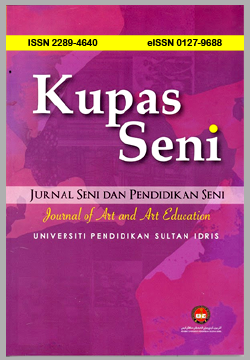Symbolism of The Sabah Bugis Motive: Sign and Meaning: Weapon and Textile
DOI:
https://doi.org/10.37134/kupasseni.vol8.2.1.2020Keywords:
textile, weapon, meaning, symbolAbstract
The research aims to analyse the motive of the traditional Bugis symbol and meaning in Tawau, Sabah (weapon & textile). The research is type is d descriptive qualitative approach with interviews, observation, document, and literature review. Data analysis techniques in this research are ethnography Clifford Geertz. The results of the research indicated that weapons and textiles have a philosophy and symbolic meaning of Bugis Sabah's motive. In this study, textile for Bugis Sabah has convinced symbolic meanings that are very dependent on the wearer for green color for nobility women, red color for teenager’s girl, red color for married women, purple color for widows, black color for elderly and white color for assistants and shaman. Lippa Sabbe’ cloth also has its meaning and philosophy. The motifs found in this Lippa Sabbe ’is Balo Tettong, Mallobang, Cobo, Balo dan Balo Renni. For weapons, the cultural value system is also an important aspect of a culture that has a concept in the lives of society. These cultural values are an important and valuable aspect of one's personality. This is also because the value of the culture is also a guideline that is significant enough for each human behavior. In culture, there are ideas and values for them to learn. In a way, they are sure to know the elements. Pamor Polobessi functions to providing content on the values of heroism (arowaenengeng); meanwhile (abbaramparengeng is meant to be wealth. Also, the authority known as (arajangeng) is placed in Polobessi.
Downloads
References
Abdullah, N., & Jambi, J. (2017). Pusat-Pusat Pemerintahan Kesultanan Melayu Johor Membina Penempatan Awal Orang Melayu Di Sepanjang Sungai Johor. Jurnal PERADABAN, 10(1), 38–61. doi: 10.22452/peradaban.vol10no1.3
Becker, H. (n.d.). Photography and Sociology. Retrieved November 18, 2020, from https://repository.upenn.edu/svc/vol1/iss1/3/
Collier. (n.d.). Retrieved November 18, 2020, from https://www.merriam-webster.com/dictionary/collier
Gendang. (n.d.). Retrieved from
https://halilintarlathief.blogspot.com/.
Goodlet, K. (2010). Tawau: the making of a tropical community. Kota Kinabalu: Opus Publications.
ILBS - Malaysian Publisher of Law Books. (n.d.). Retrieved from
http://www.malaysialawbooks.com/.
Iqbal, U. (n.d.). SEJARAH PERKEMBANGAN PELABURAN JEPUN DI BORNEO UTARA SEBELUM PERANG DUNIA KEDUA. Retrieved from https://www.academia.edu/8308992/SEJARAH_PERKEMBANGAN_PELABURAN_JEPUN_DI_BORNEO_UTARA_SEBELUM_PERANG_DUNIA_KEDUA.
La Galigo International Seminar and Festival (Barru, South ... (n.d.). Retrieved from https://www.researchgate.net/publication/250257174_La_Galigo_International_Seminar_and_Festival_Barru_South_Sulawesi_15-18_March_2002.
Lim, L., Ang, K., Mahani, M., Shahrom, A., & Md-Zain, B. (2010). Mitochondrial DNA Polymorphism and Phylogenetic Relationships of Proto Malays in Peninsular Malaysia. Journal of Biological Sciences, 10(2), 71–83. doi: 10.3923/jbs.2010.71.83
Marzuki, H. L. (1996). Aspek Hukum Administrasi dari P.T. Jurnal Hukum & Pembangunan, 26(3), 212.
doi: 10.21143/jhp.vol26.no3.509
Mattulada. (n.d.). Latoa: satu lukisan analitis terhadap antropologi-politik orang Bugis. Retrieved from https://books.google.com/books/about/Latoa.html?id=dG5oNwAACAAJ.
Nurhayati Djamas - Wikipedia bahasa Indonesia ... (n.d.). Retrieved from https://id.wikipedia.org/wiki/Nurhayati_Djamas.
Said, N. (2014). The Significance of al-Ghazālī and His Works for Indonesian Muslims: A Preliminary Study. Studia Islamika, 3(3).
doi: 10.15408/sdi.v3i3.799
Soedarso Sp. 2006. Trilogi Seni, Penciptaan, Eksistensi, dan Kegunaan Seni”. Yogyakarta: ISI Yogyakarta The adventures of John Smith in Malaya, 1600-1605. (2018, November 9). Retrieved from https://www.worldcat.org/title/adventures-of-john-smith-in-malaya-1600-1605/oclc/6007406.
The Bugis. (2018, November 10). Retrieved from
https://www.worldcat.org/title/bugis/oclc/247435344.
Wanharrun91. (n.d.). Andaya BW and Andaya LY 1982 A history of Malaysia Macmillan Press London Asean. Retrieved from





